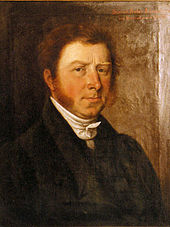Johann Heinrich Fischer (politician)
Johann Heinrich Fischer (born June 19, 1790 in Merenschwand ; † June 1861 (lost)) was a Swiss innkeeper and politician. He was the leader of the Freiämtersturm , an uprising that led to the fall of the Aargau government in 1830 .
Early years
Fischer was born as the son of a wealthy innkeeper couple, banner owner Johann Caspar Fischer (1753–1798) and Maria Anna, née. Huober (1769-1828), born. He received his training from the college in Solothurn . At the age of 18 he became a village school teacher in Merenschwand. After reaching the age of majority, he took over the Schwanen inn from his mother in December 1810 (his father had died in 1798) and gave up teaching. In 1814 he married Anna Maria Michel (1796–1869), with whom he had a total of 10 children.
From 1818 onwards, Fischer regularly attended meetings of the Helvetic Society , which campaigned for the creation of a liberal federal state in the Swiss Confederation. Heinrich Zschokke in particular had a lasting influence on Fischer's political sentiments. In 1829 he was elected to the Grand Council .
Freiämtersturm
The Catholic residents of the Freiamt have felt oppressed by the majority Protestant government in Aarau since the canton of Aargau was founded in 1803 . Several petitions calling for a lower tax burden went unheard in 1830. Fischer sat at the head of the popular movement and called for a constitutional revision. When the government remained inactive, Fischer called for the Freiamtsturm . On December 6, 1830, around 6,000 armed men moved from Merenschwand to Aarau. The government forces did not offer any resistance and the government was overthrown.
The return to Merenschwand was a triumphal procession. "General" Fischer (as the Freiamt reverently called him) was elected President of the Constitutional Council in 1831, which was supposed to draft a new constitution . However, this was not in the interests of the conservative free offices, as the liberal forces from the reformed part of the canton were able to enforce their demands. Although he was a Catholic, Fischer had allied himself with the majority Protestant liberals. His former comrades-in-arms felt betrayed because they actually wanted to weaken the canton they hated.
retreat
Fischer very quickly lost support in his home region and was confronted with numerous hostilities. He resigned from all political offices in 1836 and moved to Lenzburg in 1837 , where the population showed him much more sympathy. From then on he led a very secluded life and rarely appeared in public. He only stayed occasionally in Merenschwand.
Fischer was absent from the wedding of his daughter Josephine to the Frauenfeld lawyer and later chief judge Karl Martin Rogg on May 27, 1861. About a month later, at the end of June 1861, Fischer left his place of residence for an unknown destination. He hadn't given any information about his possible travel destination and was never heard from again. How and what he died is just as unknown as the place where he is buried.
literature
- Verena Baumer-Müller: "General" Heinrich Fischer. Schwanenwirt zu Merenschwand, b. 1790 - lost 1861 . Historical Society Freiamt, Wohlen 1991 (Our homeland; Vol. 61)
- Albert Büchi : Necrology on Carl Rogg-Fischer ; in: Roses of the Month of the Swiss Student Association, 46th year
- Angelus Hux : The house "Zum Stadtschryber" and the Rogg von Frauenfeld family. Festschrift 90 years of Raiffeisenbank Frauenfeld; ISBN 978-3-03789-002-8
- Fabian Furter: Demonstration of power by the people . In: Bremgarter Bezirks-Anzeiger , Volume 145, No. 95 (2005)
- Heinrich Rohr: Johann Heinrich Fischer In: Argovia, annual journal of the Historical Society of the Canton of Aargau. Vol. 65, 1953, pp. 142-148
Web links
- Anton Wohler: Fischer, Johann Heinrich. In: Historical Lexicon of Switzerland .
- Works by and about Johann Heinrich Fischer in the Helveticat catalog of the Swiss National Library
Individual evidence
- ^ Verena Baumer-Müller: Studying medicine around 1850. Social, economic and personal environment in Zurich, Würzburg, Prague and Vienna. Using the example of cand. Med. Jean Fischer (1828-1853) from Merenschwand and Lenzburg . Zurich treatises on the history of medicine; Juris Druck + Verlag Dietikon; 2001; No. 288; P. 16
| personal data | |
|---|---|
| SURNAME | Fischer, Johann Heinrich |
| BRIEF DESCRIPTION | Swiss innkeeper and politician |
| DATE OF BIRTH | June 19, 1790 |
| PLACE OF BIRTH | Merenschwand , Switzerland |
| DATE OF DEATH | June 1861 |
